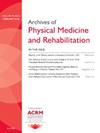Crosswalking 4 Pain Impact Measures in a Nationally Representative Sample of Adults With Back Pain
IF 3.6
2区 医学
Q1 REHABILITATION
Archives of physical medicine and rehabilitation
Pub Date : 2025-03-01
DOI:10.1016/j.apmr.2024.09.007
引用次数: 0
Abstract
Objective
To generate crosswalk equations and tables for 4 pain impact measures: the Impact Stratification Score (ISS), Oswestry Disability Index (ODI), Roland-Morris Disability Questionnaire (RMDQ), and the Pain, Enjoyment of Life and General Activity Scale (PEG).
Design
Cross-sectional survey assessing demographics and pain impact. Crosswalks were developed using item-response theory (IRT) cocalibrations and linear regressions between the ISS, ODI, RMDQ, and PEG.
Setting
Online panel.
Participants
Population-based sample of United States adults aged 18 and older. Eligibility criteria were reporting current back pain, not reporting 2 fake health conditions, and having data for 2 or more pain measures (N=1530; 37% of sample). Crosswalks were developed (n=1030) and cross-validated in a subsample of 500 participants (n=125 randomly sampled from each ISS quartile).
Interventions
Not applicable.
Main Outcome Measures
ISS, ODI, RMDQ, and the PEG.
Results
Associations of the ISS with the PEG and ODI met the criteria for IRT cocalibration. Other measure pairs were crosswalked using regression. Associations were strongest between the PEG and the ISS (r=0.87, normalized mean absolute error [NMAE]=0.38) and between the ODI and the ISS (r=0.85, NMAE=0.39). Associations were weakest between the PEG and the RMDQ (r=0.69, R2=0.48, NMAE: 0.55-0.58). Regression equations and IRT accounted for 48%-64% of the variance (NMAE: 0.38-0.58) in corresponding pain measures in the cross-validation sample.
Conclusions
The crosswalks between the ISS and common legacy pain measures created in this study of a nationally representative sample of United States adults with back pain can be used to estimate 1 pain impact measure from another. Further evaluation in clinical samples is recommended.
在具有全国代表性的成人背痛样本中交叉使用四种疼痛影响测量方法。
目标:为四种疼痛影响测量方法生成交叉方程和表格:影响分层评分(ISS)、奥斯韦斯特里残疾指数(ODI)、罗兰-莫里斯残疾问卷(RMDQ)以及疼痛、生活享受和一般活动量表(PEG):设计:横断面调查,评估人口统计学和疼痛影响。利用项目反应理论(IRT)共同校准和线性回归在 ISS、ODI、RMDQ 和 PEG 之间建立交叉线:在线小组:以人口为基础的美国 18 岁及以上成年人样本。资格标准为:报告当前背部疼痛、未报告两种虚假健康状况、拥有两种或两种以上疼痛测量数据(N = 1,530; 占样本的 37%)。在 500 名参与者的子样本(从每个 ISS 四分位中随机抽取 125 名参与者)中制定了横道图(n = 1,030)并进行了交叉验证:主要结果测量主要结果测量:ISS、ODI、RMDQ和PEG:ISS与PEG和ODI的关联符合IRT共同校准的标准。使用回归法对其他测量对进行了交叉分析。PEG 与 ISS 之间的关联性最强(r = 0.87,归一化平均绝对误差 [NMAE] = 0.38),ODI 与 ISS 之间的关联性也最强(r = 0.85,NMAE = 0.39)。PEG 与 RMDQ 之间的关联最弱(r = 0.69,R2 = 0.48,NMAE:0.55-0.58)。在交叉验证样本中,回归方程和 IRT 占相应疼痛测量方差的 48% 至 64%(NMAE:0.38-0.58):结论:在这项对具有全国代表性的美国成人背痛样本进行的研究中,在 ISS 和常见的传统疼痛测量方法之间建立的交叉路径可用于从一种疼痛影响测量方法估算出另一种疼痛影响测量方法。建议在临床样本中进行进一步评估。
本文章由计算机程序翻译,如有差异,请以英文原文为准。
求助全文
约1分钟内获得全文
求助全文
来源期刊
CiteScore
6.20
自引率
4.70%
发文量
495
审稿时长
38 days
期刊介绍:
The Archives of Physical Medicine and Rehabilitation publishes original, peer-reviewed research and clinical reports on important trends and developments in physical medicine and rehabilitation and related fields. This international journal brings researchers and clinicians authoritative information on the therapeutic utilization of physical, behavioral and pharmaceutical agents in providing comprehensive care for individuals with chronic illness and disabilities.
Archives began publication in 1920, publishes monthly, and is the official journal of the American Congress of Rehabilitation Medicine. Its papers are cited more often than any other rehabilitation journal.

 求助内容:
求助内容: 应助结果提醒方式:
应助结果提醒方式:


